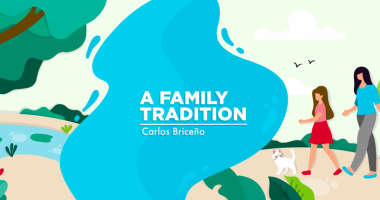Our Family’s Bad Dream Won’t Go Away

Family traditions often include fond memories. For instance, President John F. Kennedy’s family tradition involved sailing a 25-foot sailboat called the Victura. The open sea, the wind at your back, the blue skies, the sun sparkling off the water — who wouldn’t look back at those memories and not smile a bit?
Sadly, my wife’s family tradition is not as fun. That tradition is the passing on of a terminal illness through generations on her father’s side of the family. As if getting the news that she had Huntington’s disease was not bad enough, my wife, Jill, faced another unpleasant aspect of the family tradition: telling loved ones.
In the weeks ahead, as I share about her battle with this disease, I will quote Jill, because her story becomes part of my caregiving story. What she feels and shares results in me being able to understand her better and, thus, help her cope. Here is what she had to say after I asked her to tell me how she felt about the prospect of telling her family:
“Imagine getting the news that you have a disease, one that is terminal. Next, imagine giving that news to your family. Yes, it’s the worst thing that’s ever happened to you, and, yes, it will affect them. They will see you get sick. They may see your mind be not as sharp. They may even have to step up and help take care of you. There may even be a steep financial loss.
“For most diseases, the disease takes a toll on the family as a whole, but the disease itself belongs to only one person. This is not the case with Huntington’s; the disease does not belong to just you. It belonged to your parent, and now it is possible that it belongs to your child, and possibly their children, if my daughter ever decides to have any … and so on and so forth.
“It’s passed down in families in the cruelest, most awful way. It is like playing Russian roulette — with a gun that has only two chambers and one bullet. At some point in my adult life, I realized that any results, positive or negative, would be heartbreaking. What if my results are negative, which I firmly believed they would be? That would be great news for me, but what about my two brothers? What if they have it? Should I share with them the news? Will that cause issues with them? Will that push them into getting tested? I know they will be happy for me, but what if they weren’t so lucky? Will I feel guilty for not having it?
“Then, my thoughts turned to: What if I do have it? When and how do I share it with friends, with family, and the biggest question, how will I ever tell my daughter? This news is going to ruin her life. I am going to have to give my family devastating news.
“And when the time came to tell my mom, and then later my daughter, and then later my brothers, all I could say was that I was sorry. That I never wanted to do this to anyone. That I feel guilty for knowing the truth, and therefore, making their lives more complicated. Their futures more complicated. The last thing I ever wanted to do was make them sad for me. But as I know from experience, it’s not just sadness for me, it’s a sadness that comes from the knowledge that they will now carry, every day, a sadness that will creep into the deepest, darkest places in their minds.
“A sadness that will slowly drive my brothers and my daughter to a sort of silent madness, since they will now constantly wonder if that movement that they just had was normal or proof that they have it … a madness that they do not dare talk about until it’s their turn to sit in a doctor’s office and hear their results.
“I am starting to believe that the only way to stop the worrying is to talk about it. To discuss your fears before they overwhelm you. To talk to your loved ones, not only about your fears, but also how you will deal with them as you get older. And most of all, you need to deal with it head-on, no matter how scary it is.”
And so the family tradition continues …
It’s times like these that I wish there was another family tradition, one in which the disease just “sails” away — far, far away — like a bad dream does when you wake up and you realize that it wasn’t real.
Tragically, some family traditions never go away.
***
Note: Huntington’s Disease News is strictly a news and information website about the disease. It does not provide medical advice, diagnosis, or treatment. This content is not intended to be a substitute for professional medical advice, diagnosis, or treatment. Always seek the advice of your physician or other qualified health provider with any questions you may have regarding a medical condition. Never disregard professional medical advice or delay in seeking it because of something you have read on this website. The opinions expressed in this column are not those of Huntington’s Disease News, or its parent company, BioNews Services, and are intended to spark discussion about issues pertaining to Huntington’s disease.







Comments